We had a fair amount of response to last week’s blogpost on the comparability of grades awarded in GCSEs and international GCSEs in English and maths.
What are international GCSEs?
International GCSE is a generic term for a range of qualifications offered by Edexcel, Cambridge International and OxfordAQA.
Some of these are (or were) approved for pre-16 use in state-funded schools in England (a list of all such approved qualifications can be found here; note also that this does not necessarily mean that these qualifications count in school performance tables calculations). It is these approved qualifications which are included in our analysis.
While international GCSEs are commonly referred to as ‘IGCSEs’, IGCSE is in fact a trademark of Cambridge International. The number of entries in their approved IGCSEs in maths in independent schools in England in 2017 was too small to meaningfully analyse. Consequently, they are not included in this analysis.
Briefly, it found that pupils who entered international GCSEs in English or maths were more likely to achieve A*-A grades than they were in the GCSEs they took in other subjects. However, this tendency was not evident among pupils who entered GCSEs in English and maths.
Some suggested that this difference might be explained by systematic differences between the two groups.
One possibility, for example, is that, for reasons of teaching or otherwise, pupils in independent schools might be more predisposed to achieving A*-A grades in English and maths than in other subjects, and that this is the case for both GCSE and international GCSE.
As the overwhelming majority of the international GCSE group are from independent schools (and the overwhelming majority of the GCSE group are from state schools) then perhaps the findings of the first blogpost tell us more about differences in group composition than grade comparability.
So let’s repeat the analysis, this time just for independent schools. I’m just going to look at maths as there are large numbers of pupils taking both GCSEs and regulated international GCSEs.
Comparing maths results to other GCSE subjects
Overall, more pupils in independent schools entered maths international GCSEs than GCSEs. And attainment in international GCSEs tended to be higher, as the table below shows.
Now let’s compare pupils’ maths results to the grades they achieved in GCSEs in other subjects, excluding English language and modern foreign languages.
In the chart below we can see that pupils entered for maths international GCSEs were more likely to achieve A*-A grades than they were in other subjects. In contrast, those entered for maths GCSEs were less likely to achieve the equivalent grades (9-7) than they were in their other subjects.
Results for grades A*-C/9-4 are also shown below.
As in the first blogpost, A*-C/9-4 grades are more common in maths than in other subjects for both GCSE and international GCSE. But given that the vast majority of pupils are achieving grade C (or grade 4) or higher, I’m not sure whether this comparison tells us much about the severity of grading at the grade C borderline.
For those of you more technically minded, there’s some further analysis here.
Conclusion
To be clear, I’m not making any definitive claims that international GCSEs are easier or less rigorous than GCSEs. But certainly based on the analysis undertaken so far, in maths at least, more A*-A grades seem to have been awarded than we might expect given pupils’ other GCSE results.
Even with GCSEs, there are differences in grading severity between subjects, as recognised by Ofqual.
Perhaps, then, we shouldn’t expect or assume comparability of grading between different types of qualification in the same subject.
However, this would make life harder for university admissions tutors, employers and so on when faced with applications from individuals who took different types of qualification while at school.
Want to stay up-to-date with the latest research from FFT Education Datalab? Sign up to Datalab’s mailing list to get notifications about new blogposts, or to receive the team’s half-termly newsletter.


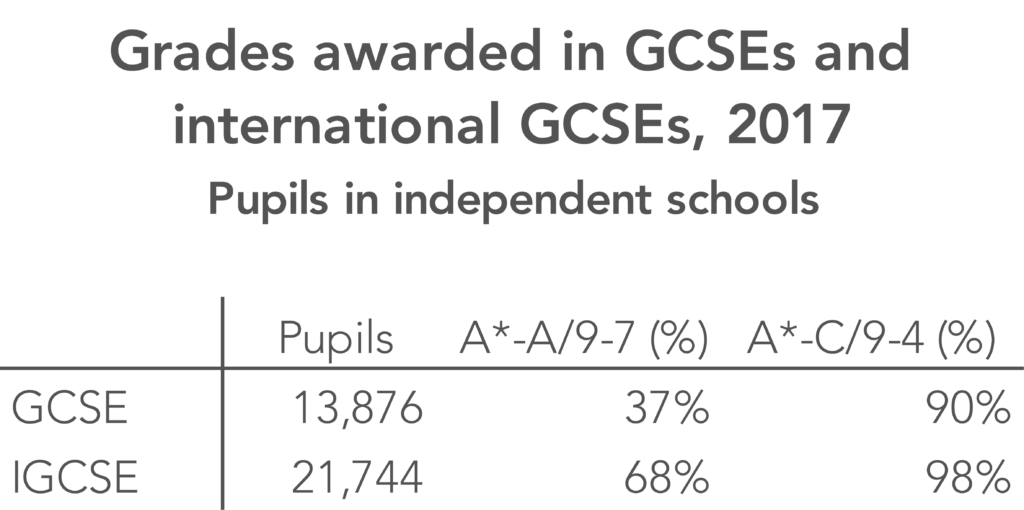
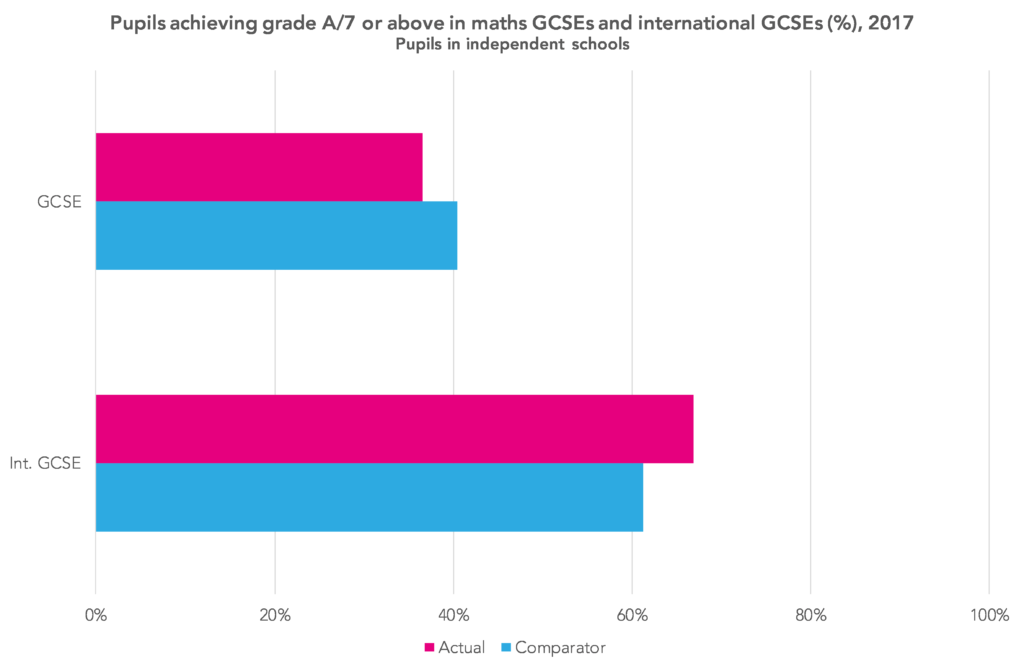
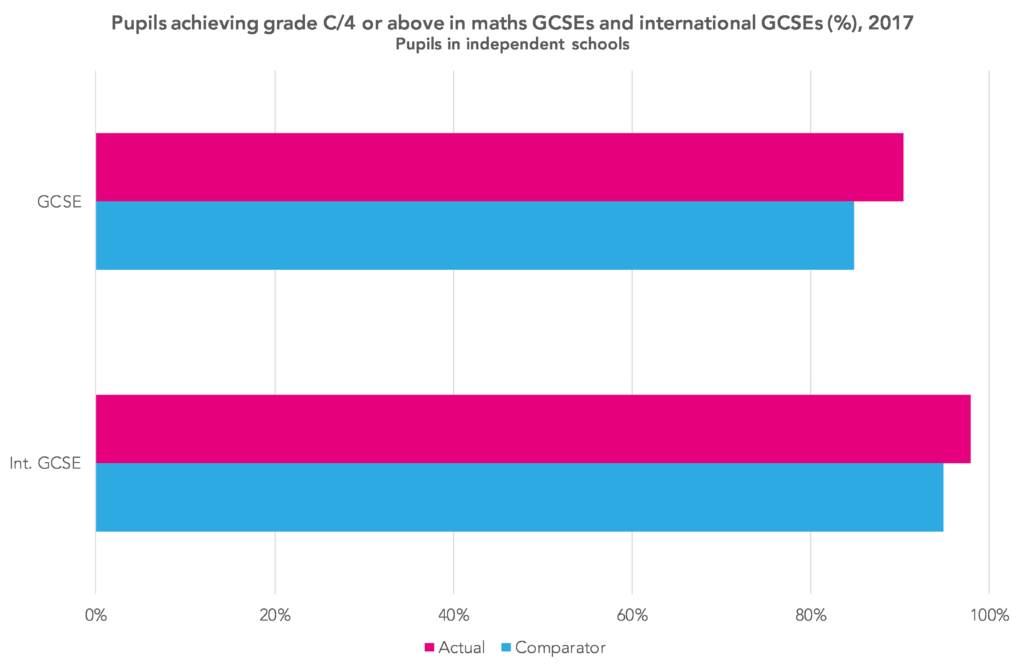

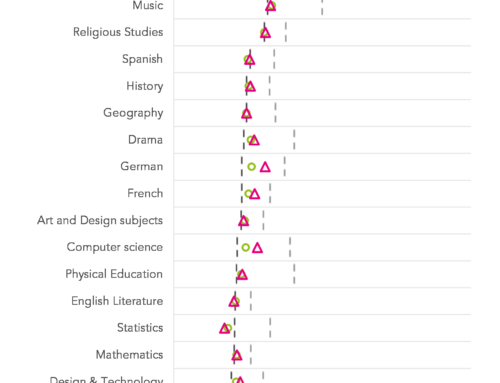
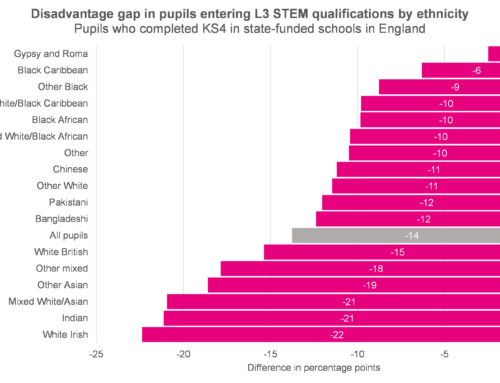
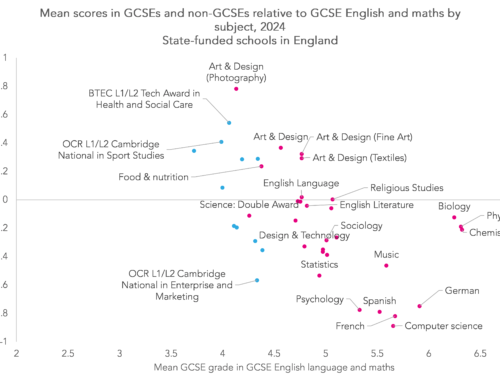
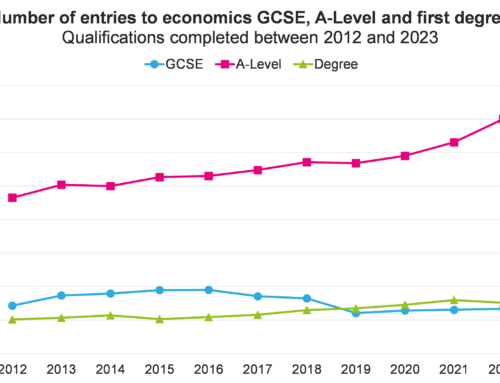
Thanks for following this up! I’d still be more interested in the comparison I suggested, though, because here you’re still, it’s clear, looking at differently able groups of pupils, with the IGCSE-targetted ones substantially more able than the GCSE ones. Is there a reason why what I suggested couldn’t be done or wouldn’t be informative?
Hi Perdita. Many thanks for commenting. In the appendix to the second blog I try to estimate a measure of ability for pupils from their results in all subjects (or at least those graded A*-G), which I think is along the lines of what you’re suggesting. Ultimately, however, I don’t think any analysis based on an observational dataset of grades awarded could be conclusive because there are always likely to be selection issues (of those you describe in your comment on the previous blogpost) which could explain the difference.
ah, I overlooked that – thanks. And yes, tricky.
(For clarity, I understand that the analysis I suggested wouldn’t help settle whether IGCSE or GCSE *maths* is easier to get top grades in, because we’d be looking only at those who took IGCSE maths! But the headline of the earlier article was about whether IGCSEs, in general, are easier than GCSEs, in general.)
The last few years we have entered our state school students for IGCSE Maths in year 10 and then regular GCSE Maths in year 11. I think its easier for students to get top grades on the IGCSE. I think a lot of 4/5 border students also do better on the IGCSE.
Does this take into account that iGCSEs are probably not aimed at native English speakers?